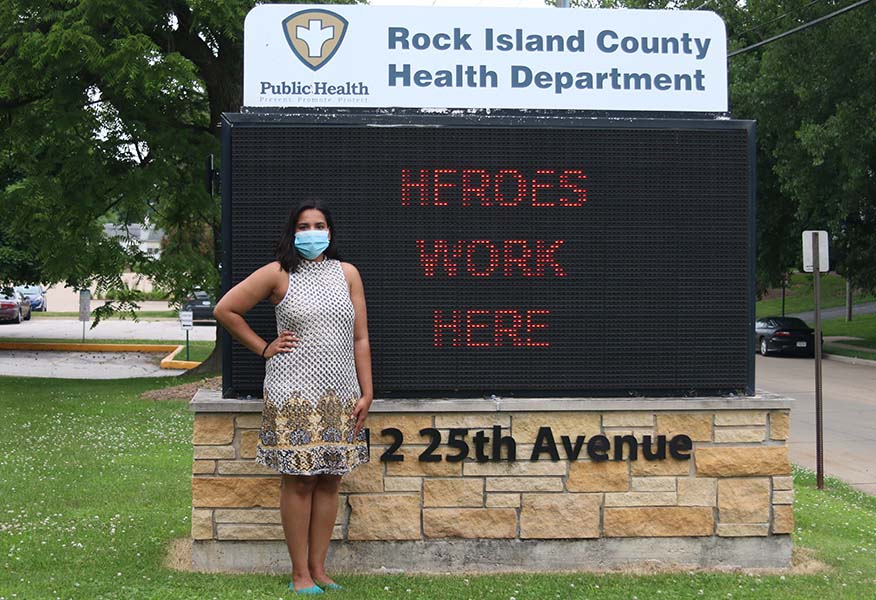Want to be a public health major? Here are some tips.
What is public health, and why should I major in it?
Many people think of public health as focusing on the actions needed to fix physical health problems affecting the public at large, but that’s only one part of it.
While that's partially true, it’s more correct to back up a little and think of public health as preventing disease, prolonging life and improving well-being. While vaccines are important to public health, so are fire extinguishers and stop lights.
Because public health focuses on communities and society, public health professionals often work in partnership with community organizations, health care facilities and governments at all levels — from local to national to worldwide.
Public health can seem as much like an art as a science. Communication skills, ethics and cultural understanding are sometimes more important than scientific knowledge in helping a community develop new behaviors that promote good health.
Public health is essential to all of us, but it usually happens behind the scenes. Major global events such as the COVID-19 pandemic can bring it to the forefront. That’s when large populations see how public health professionals work together to solve the problems of our present daily lives, and to prevent them from happening in the future.
It’s a fast-growing field, and a fascinating time to study public health. A major in public health can bring you a lifetime of interesting opportunities, challenges and successes.
What kind of school is best for a public health major?
No matter what major you're pursuing, it’s a good idea to research a variety of schools — from large regional universities to smaller colleges. The more you research and visit, the greater the chance you’ll find what matters the most to you and your future.
With a field like public health — or any of the health sciences — some might think a large university and its research facilities are the way to go. But many smaller-sized colleges can offer undergraduates even more access to labs and facilities, more hands-on learning opportunities, more professional connections, and also more individual attention.
Because students of public health need a broad background of knowledge and experiences, a liberal arts college can be perfect fit.
As a highly ranked college of the liberal arts and sciences with a trailblazing public health major, Augustana College could be a great addition to your list. Augie’s 100-level Introduction to Public Health can set you on your path in your first year.
The public health program at Augustana College
Augustana has offered a major and minor in public health since 2014 and we’re one of the first liberal arts colleges to offer this major. But the college has a long history of excellence in the health sciences, and our graduates have been pursuing careers in public health for many years.
Augustana graduates have had a 100% acceptance rate to master’s programs in public health since 1997, when our first graduate pursued a master’s degree in public health.
Why are Augustana’s public health majors so successful? It’s a combination of several factors.
At Augustana, your education will combine intensive focus in your field with a broad background of learning across other fields (so important for an interdisciplinary field like public health). The public health program will have its home in the new Peter J. Lindberg, M.D., Center for Health and Human Performance, coming in 2021. And you will have many opportunities for hands-on and professional preparation through internships, professional conferences, and service learning trips off campus and abroad.
Augustana also offers excellent advising, from your first day on campus until graduation. In your sophomore year, you can choose your public health major and will have a favorite professor as your major advisor — plus additional advisors for any other majors or minors you might have.
Because of the level of advising, Augustana students find it easier to double-major or add minors. Common fields to combine with public health include anthropology; biology; communication studies; neuroscience; political science; pre-medicine; psychology; sociology; other languages; and women, gender and sexuality studies.
What can I do for my public health major, besides go to class?
The story of human health and wellness is long, and always changing. To get the most from your public health major, look for opportunities that take you out of the classroom and into places that give you real exposure to public health at work.
Pursue internships and other hands-on learning experiences — in communities large and small, in your college town or home neighborhood, elsewhere in the U.S., or around the world. Experiences like these will boost your learning, your degree and your résumé.
At Augustana College, students go to CORE (Careers, Opportunities, Research, Exploration) for career coaching, help with graduate school applications and résumés, internships, study abroad, and more. Through CORE, every student also has access to $2,000 Augie Choice funding to support a standout learning experience such as research, an internship or study abroad.
Augustana public health majors gain experience through internships, service learning trips and professional conferences, including the Great Plains Emerging Infectious Diseases Conference and the American Public Health Association Annual Meeting. Internships take majors as far as Sydney, Australia, or as near as our own Illinois-Iowa Quad Cities — offering the excellent and diverse resources of four (actually five!) partnering cities in two states.
Public health and political science major Caroline Wator ’20 used her Augie Choice $2,000 for a trip to Brazil as a sophomore; like many students she received additional funding from the college to support a hands-on, career-building experience.
A student leader grant from CORE paid for expenses during an unpaid but important summer internship with the Chicago Department of Public Health. During that internship, Wator analyzed factors that impact policy on maternal and infant health to help create better parental leave for the city of Chicago, which later could be extended to the whole state of Illinois.
So, what can I do with my public health degree when I graduate?
A major in public health can go in many directions, bringing you a variety of career path possibilities. A partial list includes:
- Attorney
- Biostatistician
- Bioethicist
- Community health specialist
- Education and outreach professional
- Emergency response coordinator
- Engineer
- Environmentalist
- Epidemiologist
- Exercise physiologist
- Food scientist
- Health communications specialist
- Health care administrator
- Management policy advisor
- Medical writer
- Nutritionist/dietician
- Physician/nurse
- Public health policy analyst/consultant
- Vaccine researcher
Health care occupations and industries are expected to add the most new jobs in the United States in the near future, and public health is certainly no exception. More and more, the general approach to health care, wellness and health education means recognizing that we need a deeper and more caring culture of prevention, and not just treatment.
Now what?
Whether you're attracted to public health because you’re interested in law or public policy, medicine, health promotion, the environment or helping communities, your prospects are good and your options are many. But first, you need to choose the right college!
If you’d like to learn more about public health at Augustana, or any of our other ~90 majors, minors and related programs of study, you can start here.


